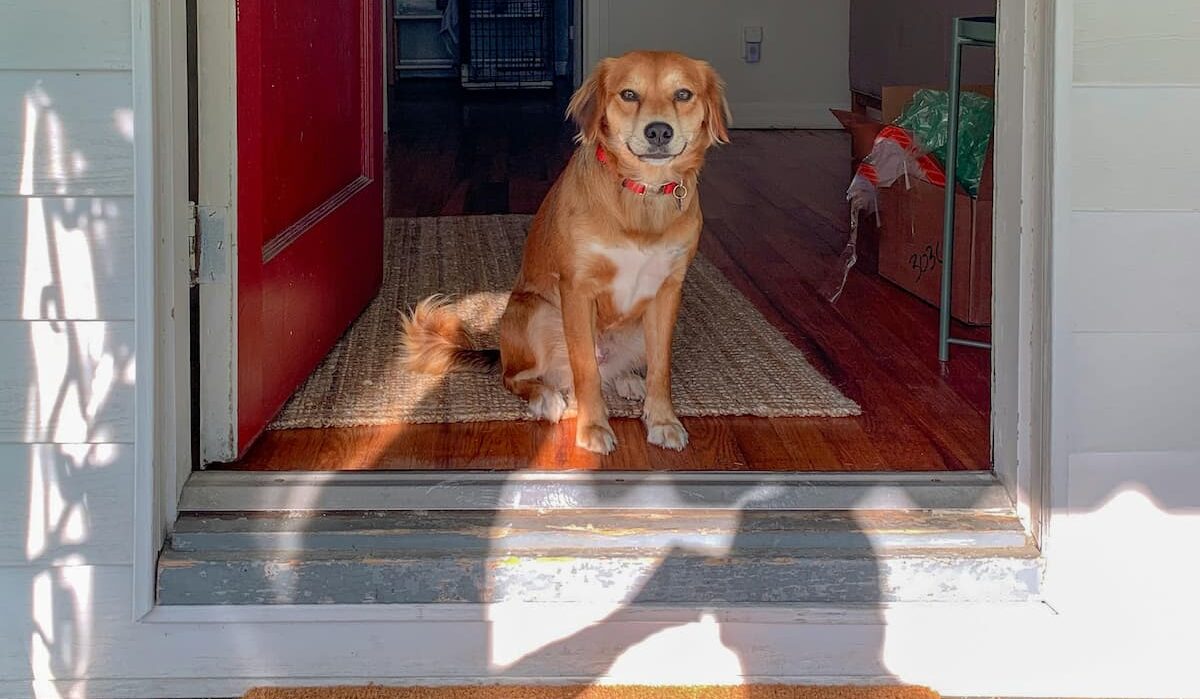Knock, knock!
Who’s there?
It’s your furry friend, wagging their tail and barking up a storm as soon as someone taps on that door.
We’ve all been there, wondering why our dogs can’t contain their excitement or curiosity when it comes to unexpected visitors.
So, why is it that our canine companions seem to lose their cool whenever a knock resonates through the house?
This article will answer the question: Why do dogs bark when someone knocks on the door?
Understanding Dogs’ Natural Instinct to Protect Their Territory and Signal Potential Threats
First and foremost, barking is a form of communication for dogs, and they use it to convey various messages.
When your dog hears a knock on the door, they might interpret it as a potential threat or intruder encroaching upon their territory.
This triggers their protective instincts, prompting them to alert you and warn the newcomer that they’re on high alert.
Barking also serves as a way for dogs to mark their presence, signaling to others that this area is occupied and they should proceed with caution.
Here are some scientific origins behind this behavior:
Canine instinct: Dogs are descendants of wolves, and barking is ingrained in their DNA.
Wolves use vocalizations as a means of communication within their pack, alerting one another to various situations.
Through domestication and years of selective breeding, dogs have retained this instinct to alert their human pack members.
Protective nature: Dogs are loyal and protective by nature.
When someone knocks on the door, they perceive it as a potential threat to their territory and loved ones.
Barking serves as their way of safeguarding their pack, demonstrating their readiness to defend their home from any possible intruders.
Social learning: Dogs are highly intuitive creatures and tend to learn from their surroundings.
If they’ve observed their owners reacting to door knocks, such as getting up to answer or becoming more cautious, they may associate these actions with the need to bark.
This social learning plays a role in reinforcing their behavior.
Acute senses: Dogs have exceptional hearing, and even the faintest sound can catch their attention.
A knock on the door generates a sudden and unfamiliar noise, causing their acute hearing to pick it up instantly.
Since they are naturally sensitive to sound, it can startle them and trigger an immediate response in the form of barking.
It’s their way of investigating and trying to understand what is happening in their environment.
What are the Reasons behind Dogs Bark when Someone Comes to the Door?
Now that you understand the origins behind this behavior here are some common reasons why dogs bark when someone knocks on the door:
Anxiety and Fear
Some dogs may bark excessively when someone comes to the door due to anxiety or fear.
This could stem from a past negative experience or a lack of socialization.
They may perceive the arrival of strangers as a threat, triggering their instinct to protect their territory.
If your furry friend displays anxious barking, it’s essential to create a safe and calm environment, while gradually introducing positive interactions with strangers.
Lack of Training
Just like any other behavior, barking can be a learned response.
If your dog realizes that barking leads to attention or rewards, they may continue this behavior every time someone arrives at the door.
It’s crucial to teach them appropriate manners and establish a “quiet” command.
Utilizing positive reinforcement techniques like treats and praise can help curb the excessive barking and encourage more desirable behavior.
Excitement and Overstimulation
For some dogs, the arrival of visitors can trigger a surge of excitement, leading to excessive barking.
They may perceive the doorbell as a signal for playtime or an opportunity for social interaction.
This is especially common in high-energy breeds.
Engaging your dog in physical exercise and mental stimulation before guests arrive can help channel their excitement and minimize barking.
Additionally, providing them with an alternative activity, like a chew toy or puzzle, can redirect their attention and keep them occupied.
It’s important to note that not all dogs have the same level of territorial instinct.
Some breeds, like German Shepherds and Rottweilers, are renowned for being excellent guard dogs due to their strong protective nature.
On the other hand, breeds such as Labrador Retrievers or Golden Retrievers may be more friendly and less inclined to bark at visitors.
Nevertheless, every dog has an innate sense of territory, and their barking is simply an expression of their natural instincts to protect and keep you safe.
The Role of Socialization in Shaping a Dog’s Reaction to Doorbell or Knock Sounds
Socialization also plays a crucial role in shaping a dog’s response to such sounds.
During their early development stages, puppies go through a critical period of socialization where they learn to interact with and adapt to their environment.
This period typically occurs between the ages of 3 and 14 weeks, and it’s during this time that they form their perceptions and reactions to various stimuli, including the sound of a doorbell or a knock.
Exposing your pup to different sounds, sights, and experiences during this socialization period can help them develop confidence and learn to differentiate between normal household noises and potential threats.
By gradually exposing them to doorbell or knock sounds in a controlled and positive manner, you can help desensitize them to these stimuli, reducing their urge to bark excessively when someone comes to the door.
Effective Techniques to Train Your Dog to Stay Calm when Someone Knocks On the Door
Dogs have been our loyal companions for centuries, but let’s admit it, their propensity to bark uncontrollably whenever someone knocks on the door can be quite frustrating.
So, why exactly do our furry friends react this way? Well, it turns out that there are a few reasons behind this behavior.
Firstly, dogs bark when they hear a knock because they are trying to alert us of a potential threat.
They see it as their duty to protect us and our home, and barking serves as a way to ward off any possible danger.
Additionally, dogs have incredibly acute hearing, so a simple knock might sound much louder and scarier to them than it does to us.
Lastly, some dogs bark out of excitement or anxiety, as they associate the sound of a knock with the arrival of visitors or the possibility of going for a walk.
Worried about your dog’s anxiety towards door knocking?
Don’t worry, as there are several effective techniques you can use to train your dog to stay calm when someone knocks on the door.
Here are a few tried-and-true methods that can help you and your furry friend find peace in these situations:
Counter-conditioning
This technique involves changing the way your dog associates the sound of a knock.
Start by creating a positive environment by giving your dog a treat or playing with their favorite toy whenever you or someone else knocks on the door.
This will help them form a positive association with the sound and reduce their anxiety.
Desensitization
Gradually exposing your dog to the sound of a knock can help them become less reactive over time.
Start by playing a recording of a knock at a low volume and reward your dog for staying calm.
Gradually increase the volume over multiple sessions until your dog can remain relaxed even at the sound of a real knock.
This technique can help your dog differentiate between harmless noises and real threats, reducing their barking in response to harmless door knocks.
Distraction and Redirection
Sometimes, all your dog needs is a little distraction to help them stay calm.
Before someone knocks on the door, prepare a special chew toy or puzzle toy filled with treats that will keep your dog occupied and redirect their focus away from the potential trigger.
This can help prevent their barking response from being triggered in the first place.
Create a Safe Space
Dogs often feel anxious or defensive when strangers are at the door, leading to excessive barking.
By providing a designated area for your dog away from the front door, such as a comfortable crate or a specific room, you can alleviate their stress.
Ensure this space is cozy and stocked with toys, treats, or familiar scents, which can distract and calm their nerves when visitors arrive.
Remember, training your dog to stay calm when someone knocks on the door requires patience, consistency, and positive reinforcement.
By using these techniques and providing your pup with love and support, you can help them overcome their barking tendencies and create a more harmonious living environment for both of you.
When and How to Consult a Dog Trainer or Behaviorist for Barking Issues
When it comes to excessive barking, sometimes seeking professional help from a dog trainer or behaviorist is the best course of action.
These experts are experienced in understanding dog behavior and can help you identify the underlying causes of your dog’s barking issues.
So, when should you consider consulting a professional, and how can they assist you in tackling this problem?
Identifying the Triggers
A dog trainer or behaviorist can help you determine what specifically triggers your dog’s barking when someone knocks on the door.
They will observe your dog’s behavior and analyze potential triggers such as fear, territorial instincts, or even just excitement.
Once the triggers are identified, they can guide you on strategies to desensitize your dog to these specific stimuli and teach them alternative behaviors.
Tailored Training Techniques
One of the reasons why seeking professional help is beneficial is because they can provide personalized training techniques suited to your dog’s needs.
Every dog is unique, and what works for one may not work for another.
By understanding your dog’s temperament, the trainer or behaviorist can come up with customized training methods to address their barking issues effectively.
This could involve reward-based training, desensitization exercises, or teaching them cues to bark only when necessary.
Long-term Solution
Dealing with excessive barking requires consistent training and patience.
A professional can help you develop a comprehensive training plan that focuses on long-term solutions.
They will not only teach your dog alternative behaviors but also guide you on how to reinforce good behavior and discourage excessive barking.
With their expertise, they can provide ongoing support and make adjustments to the training plan as needed, ensuring that you make progress towards resolving your dog’s barking issues in a sustainable way.
Remember, seeking professional help is not a sign of failure but rather a proactive step towards ensuring your furry friend’s well-being.
By consulting a dog trainer or behaviorist, you can gain valuable insights and strategies to address your dog’s barking issues when someone knocks on the door.
So, why not give it a try and embark on a journey to a quieter and happier home for both you and your furry companion
FAQ
Q: Why do dogs bark at all?
A: Dogs bark as a means of communication.
Just like we use words to express ourselves, dogs use barking to convey their emotions, intentions, and even warnings.
It’s their way of saying, “Hey, pay attention, something’s happening here!”
Q: But why do they specifically bark when someone knocks on the door?
A: It all boils down to a combination of instinct, territorial behavior, and a strong dose of protective instinct.
Q: Can you explain the instinctual aspect?
A: Absolutely!
Dogs are descendants of wolves, and wolves are pack animals.
That means they have a strong instinct to protect their territory and alert the pack (which includes you, their human family) of any potential threats.
In the wild, wolves would howl to communicate when someone approaches their territory.
Barking at the door is a domesticated dog’s modern version of the wolf’s howl.
Q: So it’s their way of protecting their “pack”?
A: Yes, precisely!
Your home is their den, their safe space, and they feel responsible for keeping it secure.
When someone knocks on the door, they interpret it as an intrusion and respond by barking.
In their minds, they are telling the stranger, “This is my pack’s territory, step back!”
Q: What about the protective instinct you mentioned?
A: Dogs are incredibly loyal creatures, and part of their protective instinct is to keep their loved ones safe.
When a dog hears a knock, they may instinctually react to protect their family.
They perceive the noise as a potential threat to the pack, and barking is their way of alerting their humans and offering protection.
Q: Is there anything else that contributes to barking behavior?
A: Yes, some dogs learn to associate the sound of a knock with exciting events or visitors.
For example, if someone knocks on the door often followed by a beloved family member entering the house or guests bringing treats, dogs may start to see knocking as a positive event.
In such cases, their barking might be a mix of excitement and anticipation.
Q: Is there a way to control excessive barking when someone knocks?
A: Absolutely!
Training your dog to understand the appropriate response to a knock on the door is key.
By using positive reinforcement and teaching them alternative behaviors like sitting or going to a designated spot, you can redirect their attention and minimize excessive barking.
Q: So, it’s normal for dogs to bark when someone knocks, right?
A: Yes, it’s entirely normal for dogs to react this way to an unexpected or unfamiliar sound.
However, it’s important to differentiate between alert barking and incessant barking.
Alert barking is natural, but excessive or prolonged barking can be a sign of anxiety, fear, or other issues that might need further attention.
Q: Is there anything we can do to help our dogs feel more at ease?
A: Creating positive associations and maintaining a calm environment can be helpful.
You can gradually desensitize them to the sound of a knock by practicing mock visits with friends or family members.
Rewarding them when they remain calm can reinforce this behavior.
Additionally, providing mental and physical stimulation, like puzzle toys or regular exercise, can help decrease anxiety and decrease their overall barking.
Q: Can we ever completely eliminate their urge to bark at a knock?
A: While we can train dogs to be more controlled in their response, it’s important to remember their instinctual and protective nature.
It might be unrealistic to expect them to never react at all.
Ultimately, what matters most is striking a balance where your dog understands your expectations, and you as their human provide the right guidance and support.
Q: It’s fascinating how our furry friends use barking to communicate with us, isn’t it?
A: Absolutely!
Dogs have an incredible way of expressing themselves, and their barking is just one aspect of their unique language.
Understanding why they react to a knock on the door can help strengthen the bond between humans and their faithful companions.
So, next time you hear that familiar ”woof” when someone knocks, remember that your dog is just fulfilling their innate role as protector and communicator.
Wrapping Up the Discussion
Remember, when a dog barks at the sound of a door knock, it all comes down to their natural instincts, their need to protect their territory, and their desire to alert their loved ones of potential danger.
Maybe now, when you hear that familiar bark upon a knock, you’ll have a better understanding of what’s going on in your furry friend’s mind.
Next time you find yourself annoyed or frustrated with your dog’s barking, take a moment to appreciate their fierce loyalty and their commitment to keeping you safe.
Remember, they’re not just making noise for the sake of it; they’re trying to warn you and ensure your well-being.
So, the next time you find yourself wondering why dogs go wild when someone knocks on the door, just remember that it’s not a mere whim, but a reflection of their loyalty and their unwavering dedication to keeping their pack safe.
Cherish their barks and appreciate their presence in your life - your protective furball is just doing their job, all while loving you unconditionally.















